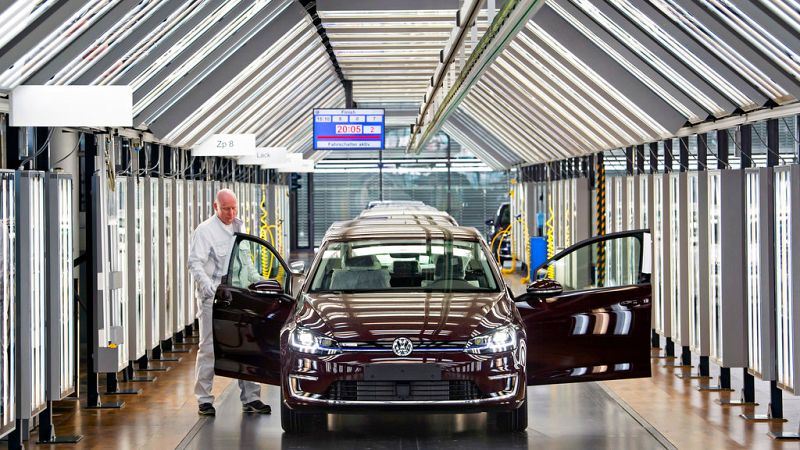
The European Commission has unveiled an action plan aimed at assisting the European automotive sector in gaining access to crucial strategic technologies such as batteries, software, and self-driving capabilities, alongside reducing regulatory hurdles.
On Wednesday, Apostolos Tzitzikostas, who serves as the Commissioner for Sustainable Transport and Tourism, unveiled the plan.
The list includes five key programs aimed at bolstering the struggling automotive sector, an industry that constitutes 7% of the EU’s gross domestic product and supports approximately 14 million jobs throughout the region.
Nevertheless, the industry has been facing difficulties because of vulnerabilities in the supply chain, elevated energy expenses, and an excessive dependency on crucial imports.
To tackle this issue, the Commission has declared a fund of €1.8 billion aimed at establishing a safe and competitive supply chain for battery raw materials.
Ensuring a secure source of batteries and their raw materials is among the primary challenges the automotive sector faces during the shift towards emission-free vehicles.
"We aim to boost local manufacturing to reduce strategic vulnerabilities, particularly when it comes to producing batteries," stated Commission President Ursula von der Leyen on Wednesday.
Moreover, the European Commission highlighted the importance of European automakers becoming frontrunners in the development of AI-driven, interconnected, and autonomous vehicles. In order to facilitate this, they committed to providing €1 billion in funding from 2025 through 2027.
An additional €570 million will be allocated for the development of charging stations.
The action plan details additional measures for enhancing the skills of workers within the sector and pledges ongoing assistance to small and medium-sized enterprises (SMEs).
More adaptable yet fundamentally unaltered clean mobility objectives
The Commission remains committed to its clean mobility goals, firmly establishing the limits on emissions that newly manufactured cars and vans will be allowed to emit in 2025, 2030, and 2035.
At present, the aim is to gradually reduce emissions from newly manufactured vehicles until 2035, after which only zero-emission models will be allowed to be produced.
"We will adhere to our committed emission goals while adopting a practical and adaptable strategy," Von der Leyen stated.
Following numerous appeals from the automotive sector, and with electric vehicle sales decelerating across Europe, the Commission pledged to introduce an updated amendment.
If implemented, this change would allow vehicle makers three years rather than just one to achieve their compliance goals (emission standards) by calculating the average from 2025 through 2027. This means that if they fall short in any single year within this period, they could compensate during another year within the same timeframe.
Even though they are currently adhering to the targets, the Commission intends to examine the regulations concerning CO2 emission standards during the latter part of 2025, earlier than initially anticipated.
In the meantime, the Commission committed to assisting in increasing the demand for European zero-emission vehicles and released a fresh proposal aimed at decarbonizing business fleet vehicles. Such fleets account for 60% of new vehicle registrations.
Enhancing the presence of European automakers on the international market
The United States is warning Europe about imposing a 25% trade tariff, posing a significant risk to the region’s automobile sector. Meanwhile, Chinese competitors have been putting pressure on European car manufacturers’ profitability in the international market.
To assist European automakers, the Commission committed to "create fair competition" through various tools. This includes implementing anti-subsidy actions along with forging free trade deals.
The Commissioner identified India as one of the "like-minded" nations where the EU might forge advantageous trade deals.
Diverse responses from the sector regarding the Action Plan.
The European Automobile Manufacturers' Association (ACEA) stated that although they supported the action plan, "important components were still absent."
"Ambitious steps must be taken to enhance infrastructure, provide demand incentives, and implement cost-reduction strategies for vehicles such as cars, vans, trucks, and buses," according to the ACEA statement.
Sigrid de Vries, the Director General of ACEA, further commented, "This suggested flexibility to achieve CO2 goals over the next few years marks a positive initial move toward a more practical strategy for reducing carbon emissions, shaped by current market conditions and geopolitical factors. This offers potential relief for manufacturers of cars and vans, assuming that the essential demand-boosting actions and charging facilities will indeed be implemented."
E-Mobility Europe stated: "It is with disappointment that we observe the weakening of Europe's CO2 targets for 2025. This could potentially hinder near-term electric vehicle sales, reduce investment certainty, and adversely affect top industry players."
Lucie Mattera, the Secretary General of ChargeUp Europe, voiced her concerns as well, stating: “The European Commission has reaffirmed the target for 2035 with zero emissions. Despite this, the flexibility measures included are a misstep that leads to ambiguity during the transitional period; however, more than 11 million electric vehicles have already hit the streets across Europe, indicating that the shift is firmly progressing."
Addressing the frequent complaint about insufficient charging stations, which hinders demand, she stated: "The electric vehicle charging infrastructure sector expands daily, providing faster speeds and enhanced, hassle-free EV charging experiences."
The main problem with the updated charging infrastructure is obtaining entry to the grid , which provides electricity.
This might require several months, or even up to a few years in certain instances.
To tackle this issue, the commissioner stated that Brussels plans to release recommendations for the member states aimed at reducing wait times.
The Commission is also considering making it obligatory for member states to prioritize these requirements, ensuring that permit approvals can be expedited.


No comments:
Post a Comment